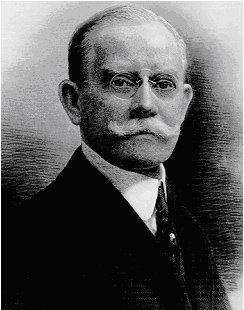Sales Guru

John Patterson, one-time president of National Cash Register (NCR) and a legendary sales strategist, was born on this day in 1844 near Dayton, Ohio.
A former mining equipment salesman, Patterson and his brother Frank bought the National Manufacturing Company in Dayton, Ohio, makers of a newfangled cash register, in 1884, and turned the sleepy company into a well-oiled country-wide sales machine. Now considered to be a prophet of modern selling techniques, Patterson instructed his salesman with the use of a detailed sales manual, known as the N.C.R. Primer, complete with sales scripts and psychologically astute "stage directions" for approaching "probable purchasers" -- as well as holding internal sales contests and conventions. He also created demand for receipts by touting their evidentiary value, thereby pumping up demand for a machine that could produce them automatically.
Patterson's approach had an immense influence on American business: it is estimated that between 1910 and 1930 approximately 1/6 of all top American executives were former students of Patterson's training at NCR, among them his son-in-law Thomas J. Watson, subsequently the head of IBM. His legend persists today, after a fashion: syndicated sales columnist and shock lecturer Jeffrey Gitomer has recently revised and revived Patterson for the 21st century with his book The Patterson Principles of Selling,
When he wasn't building superhuman salesmen, Patterson was suing competing cash register manufacturers for patent infringement and finding other ways of undercutting the competition. However, sometimes what goes around, comes around: in 1912, Patterson, Watson and NCR were convicted of violating the Sherman Antitrust Act -- based on the government's assertion that NCR's business represented 95% of the cash register market and was thereby an illegal monopoly -- as well as for other shady selling tactics. Shortly after their conviction, while the case was on appeal, Patterson and Watson became national heroes by arranging for relief for the victims of the Great Dayton Flood of 1913. Thousands petitioned President Wilson to pardon Patterson and Watson, but the gesture became unnecessary when their convictions were overturned in 1915 based on improperly admitted evidence.
After his antitrust episode (for which Patterson ultimately fired his son-in-law Watson), Patterson became an enthusiastic supporter of Wilson's foreign policy, converting part of his operation to the manufacture of military equipment and even traveling to Geneva in support of Wilson's ill-fated League of Nations gambit. Patterson died on May 7, 1922 near Philadelphia, Pennsylvania.
Categories: Business-&-Finance





0 Comments:
Post a Comment
Subscribe to Post Comments [Atom]
<< Home